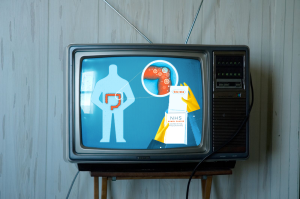By Gianpaolo Fusari and Madeleine Maxwell at the Helix Centre for Design in Healthcare, a multi-disciplinary team of designers, technologists, researchers and clinicians based at St. Mary’s Hospital, using human-centred design methods to tackle problems in healthcare.
 Over 41,000 people are diagnosed with bowel cancer every year in the UK, and at 16,000 deaths per year, it is the second most common cause of cancer death in the UK behind lung cancer.
Over 41,000 people are diagnosed with bowel cancer every year in the UK, and at 16,000 deaths per year, it is the second most common cause of cancer death in the UK behind lung cancer.
However, when diagnosed early, bowel cancer is both treatable and curable. Despite this, just 58% of people invited by the NHS Bowel Cancer Screening Programme (BCSP) actually participate in the screening. It is the groups with the highest risk of bowel cancer that have the lowest participation rates. Our challenge at the Helix Centre was to redesign the screening kit in a way that would increase uptake amongst those who are reluctant to participate.
Our process began with some design research. In contrast to a lot of academic research, in which you aim to gather data from a large and representative group of people, design research focuses on deep and insightful interviews with a small number of people at the extremes of the target population (we call them super-users), and places an emphasis on “going to where people are”, conducting interviews in people’s homes.
 On the emotional side, we found that fear and denial were large factors in causing people to ignore the test. One of the most important, yet subtle changes we have made is to reframe the screening programme to shift focus away from bowel cancer to bowel health.
On the emotional side, we found that fear and denial were large factors in causing people to ignore the test. One of the most important, yet subtle changes we have made is to reframe the screening programme to shift focus away from bowel cancer to bowel health.
It is these changes and others, inspired by real people’s experiences, and based in behavioural science, that we believe can underpin a better bowel cancer screening experience, and increase participation in the programme. The kit we have designed will go through a large-scale randomised control trial later this year to test its impact on uptake, so watch this space!